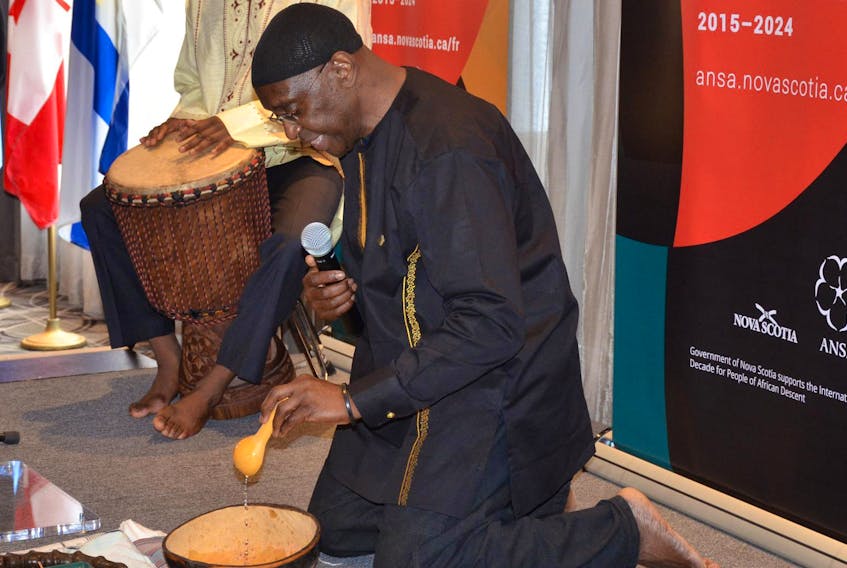The Liberal government released its plan Thursday to make the lives of African Nova Scotians better.
“Many of us in this room know the hurt caused by racism, discrimination and inequity,” Tony Ince, minister of African Nova Scotian affairs, told a gathering of about 125 people at a downtown Halifax hotel.
“Today is about change, about working together, today is about finding the solutions to correct the many challenges faced by African Nova Scotians. We have far to go in realizing our vision.”
That vision is partially
encapsulated in the government’s Count Us In document, an action plan generated in response to the International Decade for People of African Descent (2015-2024) proclaimed by the United Nations.
Premier Stephen McNeil said if the provincial plan is to be successful, government has to take ownership of the past.
“I ask you, I reach my hand out to you to accept on behalf of my ancestors and the ancestors of this province, our sincere apologies,” McNeil said.
“We collectively are standing on the shoulders of your ancestors. I need you to allow me the privilege to join you on their shoulders and together we need to reach our hands toward the promise of your children. We need your children to see the same promise that every other young child sees in this province. Opportunity is what we want to provide.”
Kate Gilmore, the Australian-born UN deputy high commissioner for human rights, lauded Nova Scotia for being the first jurisdiction in North America to sign on to the UN international decade and for being among the first in the world to launch an action plan.
She said the journey that the dedicated decade seeks to inspire will continue long past 2025.
“Recognize and acknowledge the extent of the depth of the racism to which people of African descent have been subjected, are subjected and must no longer be subjected,” Gilmore said. “Acknowledge, affirm and document that that was injury, that wasn’t just neglect, that that caused morbidity and mortality, not mere discomfort. From that injury, there were those who benefited, not merely those who lost.”
The decade is intended to tackle the impunity that has been the companion of crimes committed against people of African descent, she said.
“We have to tackle the injustice of justice, of justice systems that have not lived up to the name. We have to ensure that we enrich, enliven and empower a system of just justice.”
The former residents of Africville know well that development for people of African descent has been “a roughshod, callous thing, a story not of progress but of disregard, neglect and exclusion,” Gilmore said.
“Our futures, inevitably more intertwined than has been even our past, will not be sustainable if the fruits of development continue to be enjoyed by only some, never by all, if our social and economic systems continue to reproduce society stratified, not by effort, by contribution or creativity, but by the sheer dumb luck of where you are born, the colour of your skin, how you look.
“We have to end this.”
Thursday’s event concluded with McNeil, Ince and Gilmore signing a document to make the action plan official. The plan contains three pillars recognized by the UN — recognizing and celebrating the contributions of people of African descent, advancing social justice and inclusion policies, and creating healthier and more prosperous communities.
The event came on the heels of Prime Minister Justin Trudeau apologizing to Canadians after photos emerged of him appearing in brownface during his time as a teacher.
“I was quite surprised, a little disappointed,” Ince said of Trudeau. “The prime minister stood up, he addressed it. There is no place for that.
“I believe Mr. Trudeau was genuinely, honestly sorry for what he has done. It was a real mistake in judgment, a couple of times. We have a lot of work to do dealing with so many other things. Those types of incidents don’t help but they also give us an opportunity to have that uncomfortable conversation that we need to have and we need to have it more frequently.”
McNeil said the prime minister admitted his mistake
“I think he regretted it deeply,” McNeil said. “He asked for forgiveness from the Canadian population and Canadians will decide.”
Nova Scotia has been home to people of African descent for more than 400 years. Many of the 2.4 per cent of Nova Scotians who identify as African Nova Scotian today can trace their ancestry to the slave trade in colonial United States.
Thursday’s proclamation was also signed days after the Halifax screening of the Ellen Page documentary There’s Something in the Water, which focused on the ramifications for black residents in Shelburne who lived for decades next to an operating dump. The spectre of the police street check issue, in which blacks in Halifax were six more times likely to be checked than whites, also hung over the announcement.
“There are many items within this action plan that will work toward addressing some of those issues,” Ince said. “The movie There’s Something in The Water, we need stories like that, we need to be able to tell those stories so that people understand the breadth of challenges the community has faced for generations.”









